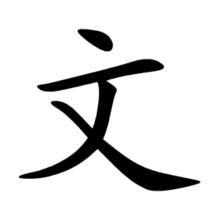| 文 | ||
|---|---|---|
| ||
| 文 (U+6587) "script, literature" | ||
| Pronunciations | ||
| Pinyin: | wén | |
| Bopomofo: | ㄨㄣˊ | |
| Gwoyeu Romatzyh: | wen | |
| Wade–Giles: | wên2 | |
| Cantonese Yale: | màhn, mahn | |
| Jyutping: | man4, man6 | |
| Pe̍h-ōe-jī: | bûn | |
| Japanese Kana: | ブン bun / モン mon (on'yomi) ふみ fumi (kun'yomi) | |
| Sino-Korean: | 문 mun | |
| Names | ||
| Chinese name(s): | (Top) 文字頭/文字头 wénzìtóu 文字旁 wénzìpáng | |
| Japanese name(s): | 文/ぶん bun 文繞/ぶんにょう bunnyō 文旁/ふみづくり fymitsukuri | |
| Hangul: | 글월 geurwol | |
| Stroke order animation | ||
 | ||
Radical 67 or radical script (文部) meaning "script" or "literature" is one of the 34 Kangxi radicals (214 radicals in total) composed of 4 strokes.
In the Kangxi Dictionary, there are 26 characters (out of 49,030) to be found under this radical.
文 is also the 93rd indexing component in the Table of Indexing Chinese Character Components predominantly adopted by Simplified Chinese dictionaries published in mainland China.
Evolution
 Oracle bone script character
Oracle bone script character Bronze script character
Bronze script character Large seal script character
Large seal script character Small seal script character
Small seal script character
Derived characters
| Strokes | Characters |
|---|---|
| +0 | 文 |
| +2 | 齐SC (=齊 -> 齊) 刘SC (=劉 -> 刀) |
| +4 | 斉JP (=齊 -> 齊) |
| +6 | 斊 斋SC (=齋 -> 齊) |
| +7 | 斍 (=覺 -> 見) 斎JP (=齋 -> 齊) 斏 |
| +8 | 斌 斐 斑 |
| +9 | 斒 |
| +12 | 斓SC (=斕) |
| +15 | 斔 |
| +17 | 斕 |
| +19 | 斖 |
The Unihan Database classifies the Simplified Chinese character 齐 and Japanese shinjitai 斉 and 斎 under this radical. However, 齐 actually belongs to radical 齐 (齊) (Simplified Chinese characters radical #140, =Kangxi Radical 210) in mainland China's standard[1] and Simplified Chinese dictionaries; 斉 and 斎 usually falls under radical 斉 (齊) (or "齊 (斉)" depending on each dictionary's standard) in Japanese dictionaries.
Sinogram
The radical is also used as an independent Chinese character. It is one of the Kyōiku kanji or Kanji taught in elementary school in Japan.[2] It is a first grade kanji[2]
References
Literature
- Fazzioli, Edoardo (1987). Chinese calligraphy : from pictograph to ideogram : the history of 214 essential Chinese/Japanese characters. calligraphy by Rebecca Hon Ko. New York: Abbeville Press. ISBN 0-89659-774-1.
- Lunde, Ken (Jan 5, 2009). "Appendix J: Japanese Character Sets" (PDF). CJKV Information Processing: Chinese, Japanese, Korean & Vietnamese Computing (Second ed.). Sebastopol, Calif.: O'Reilly Media. ISBN 978-0-596-51447-1.